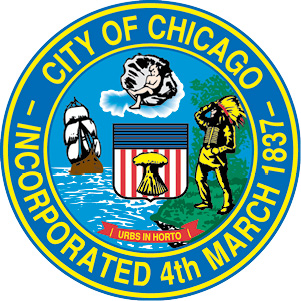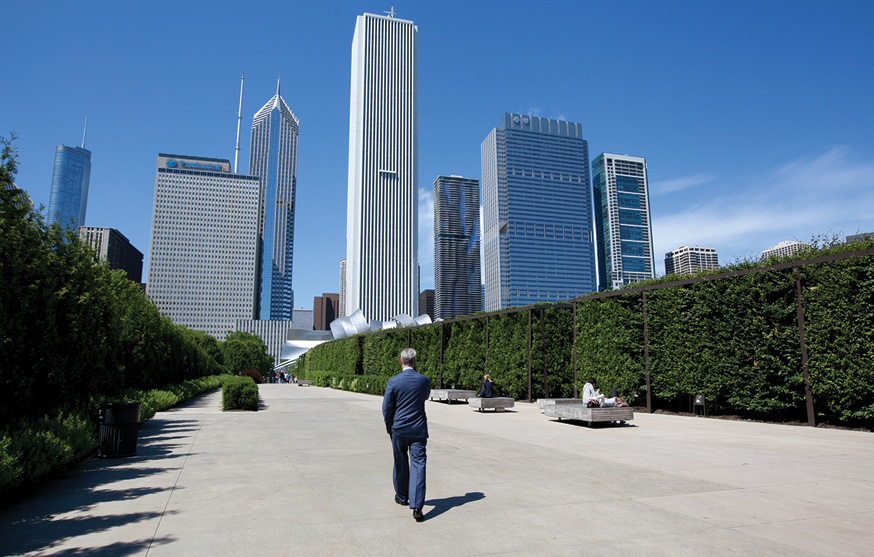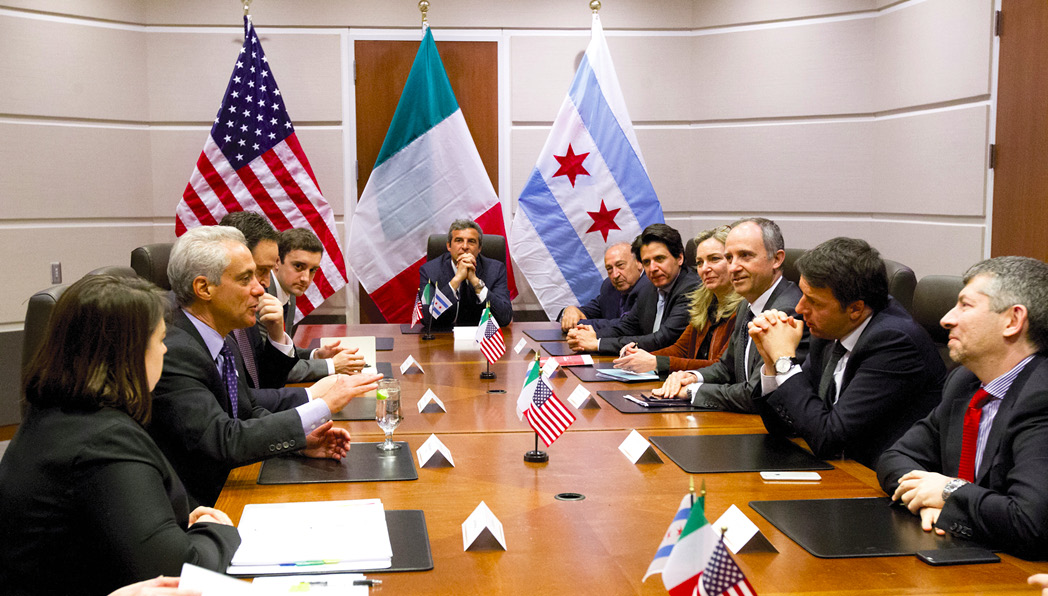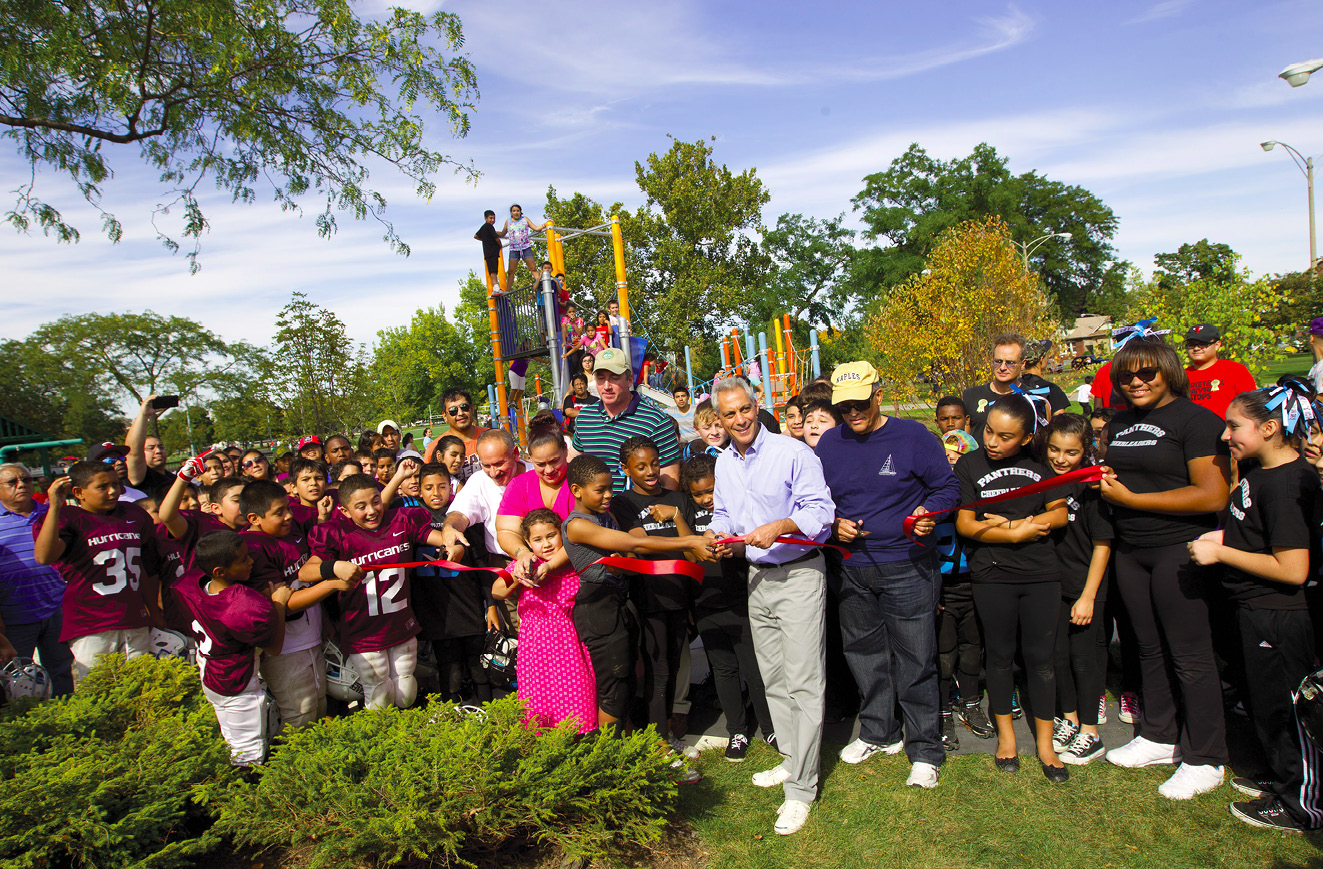- Home
- Media Kit
- Current Issue
- Past Issues
- Ad Specs-Submission
- Ad Print Settings
- Reprints (PDF)
- Photo Specifications (PDF)
- Contact Us

![]()
ONLINE

Chicago’s Strengths
Editors’ Note
Rahm Emanuel has served as the 55th mayor of the city of Chicago since 2011. During that time he has made the tough choices necessary to secure Chicago’s future as a global capital. The Mayor added more than 200 hours to the school day and year, taking Chicago from having the least educational time of any large school district in the country to being on par with its peers. He implemented full-day kindergarten for every Chicago child, and fought for and won new accountability measures to ensure every teacher and principal had the necessary resources to succeed. The Mayor’s comprehensive public safety strategy is focused on expanded prevention programs for at-risk youth, smarter policing strategies, and empowering parents and communities to reduce violence in their neighborhoods. He attracted numerous companies to Chicago and helped to build the next generation of start-ups, while investing in the infrastructure, public transportation, open space, and cultural attractions that make Chicago a great place to live, work, and play. He has worked to make government more effective, to deliver better services at a more competitive price, and to open government to the public. Prior to becoming Mayor, Emanuel served as the White House Chief of Staff to President Barack Obama and served three terms in the U.S. House of Representatives representing Chicago’s 5th District. He previously served as a key member of the Clinton administration from 1993 to 1998, rising to serve as Senior Advisor to the President for Policy and Strategy. Mayor Emanuel graduated from Sarah Lawrence College in 1981 and received a Master’s Degree in Speech and Communication from Northwestern University in 1985.

Where is Chicago today from a fiscal standpoint and are you happy with the progress being made?
The fiscal stability of the city is a tool in our economic growth toolbox, but it is not the economic toolbox. When I was running, given the condition of Chicago, there was a good reason to talk about it because it was not in a good position, but my attitude was, it’s all about certainty.
The first thing I did was I had Brookings and McKinsey do an economic study in Chicago, identify our strengths and weaknesses, and develop a plan where we want to be 10 years from now.
They came back with 10 things but three or four analysis that basically gave us a context about Chicago, and I’m very orthodox about it. They talked about the fact that Chicago is a leader in a sense that 36 percent of the people in the city have a four-year college degree or better, and in the U.S. it’s 27 percent; we have more universities in our city than any other city besides Boston; and certainty around that workforce was key. The other pieces were transportation and cost of living.
At the same time, there were three studies done, one by The Economist, one by IBM, and one by A.T. Kearney over a two-year period, all identifying Chicago as either ninth, eighth, or seventh most competitive economy in the world and number two in North America. They too identified talent, transportation, and technology as key to Chicago’s economic success.
When I looked at Chicago, it was clear the strengths are education; we’re the linchpin in the aviation and rail system and the nation’s highway system; we have some of the premiere research entities with University of Chicago, Northwestern, U of I, and Argonne Lab, and what wasn’t giving people stability was our finances.
I went on a strategy to double down on our strengths and get our challenges or our weaknesses under control.
On the fiscal side, I took a $654 million structural deficit – about 12 percent of the budget – and it’s now down structurally to a little over $100 million. I have taken all of the bad habits my predecessor practiced: one-time revenue sources; selling assets to fill budget holes; scoop and toss. In my budget every year, I put money back in the rainy day fund. I have never sold an asset to fill a budget hole, and won’t. We have also never done one-time revenue sources and, in my last budget, I cut scoop and toss by half and we’ll eliminate it by 2019.
Now, our police and fire pensions are done; labor is negotiated and done, and all three are sourced revenue-wise. I have one fund left to get done. Five years ago, four funds did not have a revenue stream; firefighters were seven years away from basically going bankrupt or not being able to pay full benefits; and we are dramatically stronger today than we were four years ago. We’re not done, but we are in a much different place in our financial picture.

Mayor Emanuel on a walk in Millennium Park
I also rejected a lot of people’s ideas that on the fiscal side, it was either raise taxes or cut everything, and I rejected both of those. There is a revenue piece and there is a structural reform piece to government. We have gone about doing both.
Also, right out of the recession, the biggest mistake would have been to either raise taxes on people who were still struggling or cut benefits across the board in a way that was indiscriminate to the condition of people’s lives.
In addition, we’re the number one city for corporate recruitment three years in a row. When it comes to infrastructure investment for our public transportation, our schools, our parks, and our airport, we lead the nation.
Just three months ago, I finished announcing the funding plan for the final runway, which will be the equivalent when it’s done of having added a third airport in capacity. It’s not just aligning a runway. It means O’Hare has added the capacity of Midway to O’Hare. No other city in the country has added a third airport or an additional runway over the last decade.
As for our transportation system, by the time 2019 is done, about 40 to 50 percent of the track will be new; every bus and train will either be new or totally rehabbed; and one-third of the stations will be totally new, and the other ones will have been fixed up or rehabbed. We are also the largest public transit system in the U.S. with 4G coverage in all subway stations and tunnels.
The ability to go to and from work, to go from one’s city to any other city in the world through aviation, we’re the only city in North America where America, United, and Southwest have major operations.
We’re the number one city for
corporate recruitment three years in a row.
When it comes to infrastructure investment for our public transportation, our schools, our parks,
and our airport, we lead the nation.
You always talk about education being at the core of everything. Look at K-12 across the nation and they’re all talking about education reform, but it’s still broken. Why hasn’t there been more positive impact?
The old model was K-12. My view is we have to start earlier and go longer.
First, half our kids had a half day of kindergarten, not even a full day, so I went to universal full-day kindergarten for every child. I’ve added 7,000 kids to full-day pre-K and I’ve gotten universal half-day pre-K for the rest.
I also have the second largest community college system in the country reaching 115,000 students. I redesigned it based on a German model so each school has a set industry focus – healthcare, transportation, distribution logistics, IT, professional services, advanced manufacturing, culinary, and hospitality, which are the industry leaders in Chicago in job creation. I brought industry in to create the curriculum, and design it in a way that kids come out with skills and knowledge in the industries where the jobs were being created.

Mayor Emanuel eating lunch on the new
Riverwalk, which runs along the Chicago River
The World Bank called our community colleges the best college-to-careers program in the country. We announced the STAR scholarship two years ago and just finished our first year for the second classes where, for those who get a B average in high school, community college is free and open to all of them. Ours is the first school system in America to have an education plan to 14th grade.
I did it not only to impact the kids and their parents’ pocketbooks, but I can now go to any corporation and offer them any kind of graduate they are after. I can give corporations everything they are looking for in talent with certainty. Talent was the big draw so I had to double-down on a major asset we weren’t using. The World Bank just called it the single best career program in the United States.
I also extended the K-12 school day and created the largest international baccalaureate program and five schools that are STEM. I took the 300 kids that were doing dual credit dual enrolled in their community colleges up to 4,500. We have the largest AP program in the U.S. with more minorities taking AP classes than ever before. Our graduation rate under my tenure went from 56.5 percent to 74 in June, and our freshman are on track for 84 percent – this is a 60 percent growth. We’re not just meeting the national standards but we’re exceeding them.
Graduation is up now every year
for the past five years.
ACT scores are the
highest ever. Attendance is the highest ever.
This is leading the country.
Our eighth-graders led the country in math gains for urban systems, and our fourth-graders led the country in reading gains. There are only three school systems in K-12 that show math and reading gains for fourth and eighth graders on the NAEP test – Miami-Dade; Washington, D.C., and the City of Chicago.
The country’s rate of high school graduation going on to college is 42 percent; Chicago, for the first time ever, is 42 percent even though 90 percent of the kids in the City of Chicago are at poverty level or below. The population that we’re responsible for is a lot more challenged than the nation’s and yet we meet them on college attendance.
Graduation is up now every year for the past five years. ACT scores are the highest ever. Attendance is the highest ever. This is leading the country. We also now are the only city that has a model. For those kids who get a B average and go on to free community college, 91 percent continue into the second year.
I have shed a lot of weight to push a system to make fundamental changes, like the full school day. When I instituted the full school day, it was the largest increase in time in school in the history of the U.S. – it’s the equivalent of adding 2.5 years to every child’s education from kindergarten through high school. This is the system that had been called the worst public school system in America. We can make a difference.
I made this reform in city colleges and we spent $38 million a year on remedial education, math, and reading. We decided to give B students where I don’t have to spend money on reading and math an incentive: if they keep their B average, we’ll give them community college for free, and if they maintain that B average, for every college in Chicago, we’ll enroll them and give them a break on tuition – all 15 institutions of higher education have been part of the program and it’s the first of its kind in the country.
Mayors are responsible for K-12; I believe I’m responsible from pre-K to community college. We’re now the only city with an educational model that is reflecting the job model of tomorrow.

Mayor Emanuel at a roundtable discussion with
Italian Prime Minister Matteo Renzi during his visit to Chicago
Where do things stand today in Chicago in terms of the relationship with the police force?
We have different relationships in different parts of the city. We’re making changes related to issues similar to what New York and Baltimore are dealing with. We’re confronting the issues, we’re going to make the fundamental reforms. There are more issues between the police department and communities of color than there are between the police department and the city. This doesn’t mean people who aren’t immediately or intimately affected aren’t concerned – they are, and we are going to make those tough changes.
Our other issue relates to gun violence. People always do these comparisons but we have tough gun laws – the problem is that our surrounding states do not. New York has New Jersey and Connecticut gun laws; I have Wisconsin and Indiana gun laws that affect my city. They have a three-year minimum for gun crimes; we don’t in Chicago. That is our state’s responsibility and we’re trying to change that so we would have a three-year minimum for serious repeat gun offenders. We have a different gang culture that is historic, and we also have concentrations of poverty that are big influences because of the loss of opportunity.
My concern is for a child in Auburn Gresham on the South Side, or on the North Side in Albany Park, looking at the city coming out of their home or school and they see all these great structures and high-rises and power and energy, and if they think that’s their city, nothing will stop them. But if they come out of their front door and think that’s another world, then we’re not going to be the city we can be. We have a lot of potential here in every neighborhood and my job is to make sure that when it comes to the vision for tomorrow, it has to include everybody.
Today, if one goes to a prison, the common thread is African-American, male, 18-24 without a high school degree. The one thing I can affect is that last point, which is why I drive on the education, because if I have a young man with a high school degree, he is more likely to think he has a future and he’ll be less likely to do something stupid today.

Mayor Emanuel at the ribbon cutting for Riis Park
on Chicago’s northwest side
Is it hard to be optimistic when you look at the environment in Washington today?
I had the mayors in for a local conference and all of us were talking about how our national governments can’t scratch two nickels together. We’re on our own but the economic, intellectual, and cultural energy of the respective counties come out of the cities and metropolitan areas surrounding our cities.
The reason I wanted to leave Washington besides just to go home, and still pursued the elected office of mayor, is that I believed one can still put their thumb on this scale and tip it. The River Walk will be one of my accomplishments that people will remember; I transformed the way the city interacted with the Chicago River, the city’s second water way. I created full-day kindergarten for every child. Those who follow me will do other things, but I don’t believe anybody will ever roll that back. I spilled a lot of blood getting it. There is a price to be paid for going back on a full school day and full school year. I don’t think anybody will ever abandon a Chicago Star Scholarship where with a B average, community college is free. These are lasting things and they can still be done.
People know that we don’t have a common foundation anymore and my goal is to concentrate on how to create that common sense of our city that encompasses all of us. We can still do that in a city.
Our country has some real issues. Generally, there is a hate of the status quo but when change is offered, people say that’s not what they want. It’s tough either way, but today, it’s not like there are little laboratories of democracy. New York did the High Line. There are mayors from around the country who try to rethink water in their cities since I did our Riverwalk, a $90-million project. I have since gotten $8.5 billion of private development along the river. I opened up a new train station in Fulton Market and that has created almost $3 billion of economic activity.
Do you take the time to reflect and enjoy the changes that you have accomplished?
In politics, one has to be idealistic enough to know why something is being done and ruthless enough to want to get something done. I don’t buy that it’s either/or.
We did a rally for our Chicago Star scholars, and four kids who went through the program last year talked to the incoming class with their parents. This has grown from 950 in one year to now a bit over 1,400. There was a Hispanic woman who was a dreamer; an African-American woman at one school – and they’re all going on to college and one is even talking about getting a Ph.D.
One guy came up with his father – he’s going on to become an ENT nurse. His father said he wasn’t sure his kid would be able to go to college or he would have to take a second mortgage on his home. Without this, he said he would be nowhere as a father looking at his son, because he wouldn’t have been able to do what he needed to do to provide for his son. He looked at me and thanked me because he said I saved him from having to avoid doing something he didn’t want to do for his family.
I will always know what I did and there are tons of examples of that. I had a mother two years ago who told me her child had half-day kindergarten and she was always struggling to figure out who would pick up her child. She needed the full day care so she could be a good worker and a good parent. My test is, at some point when I have a successor, they will build on these. My guess is they won’t take them down, and I will know they have stood the test of time by doing what’s right.
Do you think about your next focus?
No. My entire focus is what is next for the city, not what’s in it for me.•